| << Chapter < Page | Chapter >> Page > |
The OpenStax version of Principles of Microeconomics for AP ® Courses further expands on Taylor’s original end of chapter materials by offering four types of end-of-module questions for students.
Principles of Microeconomics for AP ® Courses includes an updated art program to better inform today’s student, providing the latest data on covered topics.

Timothy Taylor, Macalester College
Timothy Taylor has been writing and teaching about economics for 30 years, and is the Managing Editor of the
Journal of Economic Perspectives , a post he’s held since 1986. He has been a lecturer for The Teaching Company, the University of Minnesota, and the Hubert H. Humphrey Institute of Public Affairs, where students voted him Teacher of the Year in 1997. His writings include numerous pieces for journals such as the
Milken Institute Review and
The Public Interest , and he has been an editor on many projects, most notably for the Brookings Institution and the World Bank, where he was Chief Outside Editor for the
World Development Report 1999/2000, Entering the 21st Century: The Changing Development Landscape . He also blogs four to five times per week at http://conversableeconomist.blogspot.com. Timothy Taylor lives near Minneapolis with his wife Kimberley and their three children.
Steven A. Greenlaw, University of Mary Washington
Steven Greenlaw has been teaching principles of economics for more than 30 years. In 1999, he received the Grellet C. Simpson Award for Excellence in Undergraduate Teaching at the University of Mary Washington. He is the author of
Doing Economics: A Guide to Doing and Understanding Economic Research , as well as a variety of articles on economics pedagogy and instructional technology, published in the
Journal of Economic Education , the
International Review of Economic Education , and other outlets. He wrote the module on Quantitative Writing for
Starting Point: Teaching and Learning Economics , the web portal on best practices in teaching economics. Steven Greenlaw lives in Alexandria, Virginia with his wife Kathy and their three children.
| Eric Dodge | Hanover College |
| Cynthia Gamez | University of Texas at El Paso |
| Andres Jauregui | Columbus State University |
| Diane Keenan | Cerritos College |
| Dan MacDonald | California State University San Bernardino |
| Amyaz Moledina | The College of Wooster |
| Craig Richardson | Winston-Salem State University |
| David Shapiro | Pennsylvania State University |
| Ralph Sonenshine | American University |
| Bryan Aguiar | Northwest Arkansas Community College |
| Basil Al Hashimi | Mesa Community College |
| Emil Berendt | Mount St. Mary's University |
| Zena Buser | Adams State University |
| Douglas Campbell | The University of Memphis |
| Sanjukta Chaudhuri | University of Wisconsin - Eau Claire |
| Xueyu Cheng | Alabama State University |
| Robert Cunningham | Alma College |
| Rosa Lea Danielson | College of DuPage |
| Steven Deloach | Elon University |
| Debbie Evercloud | University of Colorado Denver |
| Sal Figueras | Hudson County Community College |
| Reza Ghorashi | Richard Stockton College of New Jersey |
| Robert Gillette | University of Kentucky |
| George Jones | University of Wisconsin-Rock County |
| Charles Kroncke | College of Mount St. Joseph |
| Teresa Laughlin | Palomar Community College |
| Carlos Liard-Muriente | Central Connecticut State University |
| Heather Luea | Kansas State University |
| William Mosher | Nashua Community College |
| Michael Netta | Hudson County Community College |
| Nick Noble | Miami University |
| Joe Nowakowski | Muskingum University |
| Shawn Osell | University of Wisconsin, Superior |
| Mark Owens | Middle Tennessee State University |
| Sonia Pereira | Barnard College |
| Brian Peterson | Central College |
| Jennifer Platania | Elon University |
| Robert Rycroft | University of Mary Washington |
| Adrienne Sachse | Florida State College at Jacksonville |
| Hans Schumann | Texas AM |
| Gina Shamshak | Goucher College |
| Chris Warburton | John Jay College of Criminal Justice, CUNY |
| Mark Witte | Northwestern |
| Chiou-nan Yeh | Alabama State University |
OpenStax projects offer an array of ancillaries for students and instructors. Please visit http://openstaxcollege.org and view the learning resources for this title.

Notification Switch
Would you like to follow the 'Principles of microeconomics for ap® courses' conversation and receive update notifications?